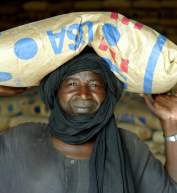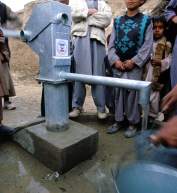Congressional Testimony
Wednesday, December 5, 2012
Chairman Coons, Ranking Member Isakson, Members of the Subcommittee, thank you for inviting me to speak with you today. Mali is facing a complex emergency: a political crisis, recovery from a major drought, and threats to internal and regional security. I would like to provide an update on the current situation and how it has affected our programming, as well as outline the key factors that are needed for development to progress.
Complex Emergency Environment
Insufficient rains during the 2011 Sahel agricultural season led to nearly 19 million people being at risk of food insecurity, nearly half of whom required emergency food assistance during 2012, according to national governments and U.N. data. In fiscal year 2012, the governments of eight Sahel countries and the U.S. Government declared disasters. Since the beginning of this year, the U.S. has responded with more than $445 million in programming across eight countries in the Sahel. Food insecurity was exacerbated by the conflict in northern Mali, which led to large population displacement inside of Mali and to refugee flows in neighboring countries, further straining the ability of both displaced people and host communities to cope with increased food insecurity.
Wednesday, November 28, 2012
The Food and Agriculture Organization of the United Nations (FAO) recently released a report estimating that there are now approximately 870 million hungry people in the world, 98 percent of them living in developing countries. While these numbers have adjusted down from recent estimates, it is still 870 million too many. Compounding this problem, research indicates that by the year 2050, the world's population is projected to increase by 38 percent to more than 9 billion, which, combined with changing diets, will require up to a 60 percent increase in food production to feed us all. We confront these challenges in a world that has less land and fewer resources available for production.
Consistent with the U.S. Strategy Toward Sub-Saharan Africa, USAID's development activities target the root causes of the popular frustration with the Government of Nigeria that stokes instability in the North, Middle Belt and Niger Delta regions: poor governance, insufficient respect for human and civil rights, inadequate delivery of basic services, and a lack of economic opportunity, particularly for young Nigerians. Creating a culture of peace that acknowledges and transcends Nigeria's ethnic, religious, and cultural diversity is critical for stability, democracy, and economic development.
Mali is facing a complex emergency: a political crisis, a major drought, and threats to internal and regional security. These interrelated crises call for a careful and considered development response. According to the World Bank, countries that have become characterized as fragile states require 20 to 25 years to recover, at great cost to their own people as well as to the international community in terms of resources diverted to stabilize and get those states back on the track of effective, transparent governance. While Mali is not currently a fragile state, it is in a fragile situation.
Our goal is a stable, self-reliant, unified Iraq. This is critical to U.S. interests in the Middle East. It is a goal made possible through enormous sacrifice by Americans and Iraqis alike. USAID is adjusting its footprint in Iraq in line with its development strategy and programmatic needs. We are focused on Iraq's sustainable development under the terms of the U.S.- Iraq Strategic Framework Agreement. Over the past ten years, USAID's role in Iraq progressed through three distinct stages:
-
Immediately after the invasion, USAID's emphasis was on restoring essential infrastructure and services and supporting transitional democratic processes.
-
Then, as part of the military and civilian counterinsurgency campaign, we concentrated on stabilizing Iraqi communities, and strengthening government institutions.
-
Now, with the completion of the transition to civilian leadership of the U.S. effort in Iraq, USAID's focus is on helping Iraqis improve how they manage their own resources for development.
Sub-Saharan Africa is one of the fastest growing regions in the world. In 2011, it was home to six of the world's 10 fastest growing economies. Foreign direct investment is approaching $80 billion a year, and trade has tripled over the last decade. Consumer spending is set to rise 80 percent by 2020 and Africa now has a fast-growing middle class, expected to increase from 60 million to 100 million people by 2015. The continent's fortune is not the outcome of good luck. It is the result of years of hard work and better macroeconomic management; improved economic and political governance; a reduction in armed conflicts; increasing foreign capital inflows, particularly direct investment; and improvements in the business climate.
The Lord’s Resistance Army (LRA) remains amongst the most persistent perpetrators of human rights violations in the world. As recently as last month, a UN report found that the LRA continues to commit all six grave violations against children identified by the UN Security Council as war crimes.
Chairman Rohrabacher, Ranking Member Carnahan, and distinguished members of the Subcommittee, thank you for the opportunity to appear before you today. My name is Larry Sampler and I am the Senior Deputy Assistant to the Administrator & Deputy Director of the Office of Afghanistan & Pakistan Affairs at the United States Agency for International Development (USAID). I am glad to be here to discuss USAID’s work in Afghanistan and the various methods we are employing to ensure rigorous, multi-layered oversight of U.S.
Thank you, I welcome the opportunity to participate in today’s hearing, which is shining a spotlight on the disturbing trend toward growing restrictions on the space for civil society institution in a number of countries and the physical threats against citizens stepping forward to demand change in their societies.
Chairman Smith, Ranking Member Bass, Members of the Committee, I appreciate your giving me the opportunity to speak before you today on the deepening humanitarian crises in Sudan and South Sudan.
Good morning Chairman Coons, Ranking Member Isakson, and members of the Subcommittee. Thank you for inviting me to speak with you today.
Pages
Last updated: December 05, 2012








Comment
Make a general inquiry or suggest an improvement.